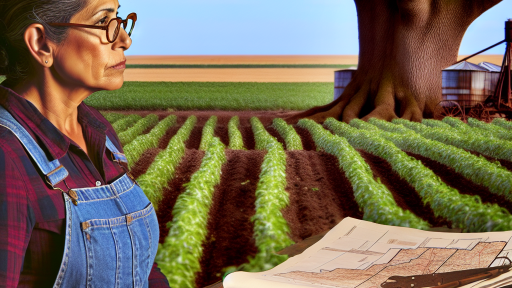Overview of Global Supply Chains in Agribusiness
Defining Global Supply Chains
Global supply chains encompass the entire journey of agricultural products.
This journey begins with production and concludes at the consumer’s table.
Understanding these chains is crucial for agribusiness success.
The Role of Producers
Producers play an essential role in global supply chains.
They grow crops and raise livestock needed for food production.
Moreover, their practices significantly impact product quality and supply availability.
Logistics and Transportation
Logistics facilitate the movement of goods along the supply chain.
Transportation networks connect producers to manufacturers, distributors, and consumers.
Efficient logistics minimize costs and ensure timely delivery of products.
Technology in Supply Chains
Technology revolutionizes global supply chains in agribusiness.
It improves efficiency through automation and data analysis.
Moreover, technology enhances transparency and traceability in the supply process.
The Influence of Global Markets
Global markets significantly influence supply chain dynamics.
Changes in demand in one region affect producers and suppliers worldwide.
Exchange rates and trade policies also play a crucial role in market interactions.
Transform Your Agribusiness
Unlock your farm's potential with expert advice tailored to your needs. Get actionable steps that drive real results.
Get StartedEnvironmental and Social Considerations
Global supply chains must consider environmental sustainability.
They should aim to reduce emissions and waste throughout the supply process.
Additionally, fair labor practices are essential for a responsible agribusiness.
Challenges in Global Supply Chains
Despite their importance, global supply chains face numerous challenges.
Natural disasters can disrupt production and transportation routes.
Pandemics like COVID-19 have also exposed vulnerabilities in global networks.
Future Trends in Agribusiness Supply Chains
Looking ahead, supply chains will continue to evolve.
Sustainability will become a guiding principle for future practices.
Innovations in technology will shape the efficiency and resilience of supply chains.
Key Components of Agribusiness Supply Chains
Farmers
Farmers are the backbone of the agribusiness supply chain.
They produce the raw materials needed for food production.
Additionally, they play a crucial role in meeting consumer demands.
Farmers utilize various techniques to enhance crop yields.
They often have to adapt to changing environmental conditions.
Moreover, farmers must maintain sustainable practices.
Through innovation, they improve efficiency in production.
Distributors
Distributors serve as essential intermediaries in the supply chain.
They handle the logistics of transporting goods from farms to markets.
Furthermore, they manage inventory and storage effectively.
Distributors ensure that products are fresh and readily available.
They often coordinate with farmers to streamline operations.
Using technology, they optimize supply chain efficiency.
Additionally, distributors play a role in market trends.
Retailers
Retailers connect consumers directly to agribusiness products.
Showcase Your Farming Business
Publish your professional farming services profile on our blog for a one-time fee of $200 and reach a dedicated audience of farmers and agribusiness owners.
Publish Your ProfileThey offer a wide range of food choices to customers.
Retailers are responsible for product presentation and marketing.
Additionally, they gather consumer feedback to inform suppliers.
Moreover, retailers maintain relationships with both distributors and farmers.
This collaboration ensures a smooth supply chain process.
Lastly, retailers often emphasize sustainability in their sourcing strategies.
The Role of Technology in Streamlining Supply Chain Processes
Enhancing Efficiency with Automation
Automation simplifies repetitive tasks in the supply chain.
It reduces the chances of human error and increases speed.
For instance, systems like Robotics Process Automation (RPA) handle data entry effectively.
These technologies also enable real-time inventory management.
Consequently, businesses can respond quickly to demand fluctuations.
Improving Communication with Cloud Technology
Cloud-based platforms foster better collaboration among stakeholders.
Such platforms allow instant access to crucial supply chain data.
Moreover, they facilitate seamless communication with suppliers and distributors.
This transparency helps in coordinating efforts during disruptions.
Data Analytics for Informed Decision Making
Data analytics provides insights for optimizing supply chain operations.
Companies harness predictive analytics to forecast demand accurately.
This foresight enables better inventory management strategies.
Additionally, analytics can identify inefficiencies within the supply chain.
As a result, businesses can implement targeted improvements.
Utilizing IoT for Real-time Tracking
The Internet of Things (IoT) plays a crucial role in supply chain management.
With IoT devices, companies can monitor goods during transit.
This technology ensures that products remain within required conditions.
Furthermore, it allows businesses to track delivery times in real-time.
Consequently, they can make adjustments to improve customer satisfaction.
Gain More Insights: Essential Steps for Successful Farm Succession
Challenges Faced by Global Agribusiness Supply Chains
Climate Change
Climate change presents significant challenges for agribusiness supply chains.
Extreme weather events disrupt crop production and supply availability.
Droughts affect water supply, leading to reduced yields.
Flooding can destroy fields and make them unworkable for extended periods.
Moreover, changing climates encourage pest and disease outbreaks.
Agribusinesses must adapt to new agricultural practices and technologies.
They need to invest in resilient infrastructure to minimize damages.
Collaboration between stakeholders is essential for effective adaptation.
Research and development play a crucial role in developing climate-resilient crops.
Furthermore, sustainable practices can mitigate the impacts of climate change.
Trade Policies
Trade policies greatly influence global agribusiness supply chains.
Tariffs and quotas can restrict access to vital markets and resources.
For instance, fluctuating tariffs impact pricing and profitability.
Regulatory changes may alter the competitive landscape dramatically.
Showcase Your Farming Business
Publish your professional farming services profile on our blog for a one-time fee of $200 and reach a dedicated audience of farmers and agribusiness owners.
Publish Your ProfileAdditionally, trade agreements can facilitate smoother international exchanges.
However, trade tensions can create uncertainty for farmers and exporters.
Frequent changes in policies require adaptability and strategic planning.
Moreover, businesses need to comprehend the nuances of international regulations.
Effective lobbying for favorable trade conditions is paramount for agribusiness success.
Ultimately, navigating trade policies demands agility and foresight.
You Might Also Like: SEO Tips for Agribusiness E-commerce Sites
Impact of Consumer Trends on Agribusiness Supply Chain Strategies
Shifting Consumer Preferences
Consumers increasingly prioritize fresh and organic products.
This trend drives agribusinesses to adapt their sourcing strategies.
Consequently, many companies invest in local suppliers.
Additionally, transparency in product sourcing gains importance.
Brands that communicate their sourcing practices build trust with consumers.
Rise of Sustainability
Sustainability has become a key concern for many shoppers.
Consumers want to purchase goods that minimize environmental impact.
This shift prompts agribusinesses to adopt sustainable practices.
From organic farming to waste reduction strategies, companies evolve.
Adopting eco-friendly practices not only attracts consumers but also reduces costs.
Influence of Technology
Modern technology reshapes consumer interactions with products.
Online shopping offers convenience and variety to consumers.
This trend encourages agribusinesses to enhance their digital presence.
Moreover, data analytics helps companies understand consumer behavior.
Consequently, businesses can tailor their offerings accordingly.
Health and Wellness Focus
The pursuit of health and wellness influences agribusiness strategies.
Many consumers prefer products that promote better health.
This leads to increased demand for nutritious food options.
Agribusinesses respond by introducing healthier product lines.
Education on the benefits of these products further engages consumers.
Global Sourcing and Trade Policies
Consumer trends affect global sourcing and trade policies.
Strategically sourcing international products can meet diverse consumer demands.
However, emerging trade regulations complicate global supply chains.
Agribusinesses must stay informed on changing policies to adapt.
This proactive approach reinforces supply chain resilience.
Personalization and Consumer Engagement
Consumers increasingly seek personalized experiences with brands.
Agribusinesses can leverage consumer data to personalize marketing efforts.
Engaging customers on social media fosters brand loyalty.
Furthermore, feedback allows businesses to refine their offerings.
Ultimately, personalized strategies enhance customer satisfaction.
Uncover the Details: Cloud Computing Applications in Modern Farming

Case Studies of Successful Supply Chain Management in Agribusiness
Introduction to Supply Chain Management
Supply chain management plays a pivotal role in agribusiness.
It involves coordinating various aspects of production, distribution, and sales.
Showcase Your Farming Business
Publish your professional farming services profile on our blog for a one-time fee of $200 and reach a dedicated audience of farmers and agribusiness owners.
Publish Your ProfileEffective management ensures efficiency and customer satisfaction.
Case Study: FreshFarm Produce
FreshFarm Produce exemplifies success in supply chain management.
Located in California, the company specializes in organic vegetables.
Their streamlined logistics enables quick delivery to retailers.
Moreover, they utilize technology for real-time inventory tracking.
This approach reduces waste and improves freshness for consumers.
Effective Collaboration
FreshFarm emphasizes partnerships with local farmers.
This fosters a reliable supply of high-quality produce.
Additionally, they provide training to improve farming techniques.
Consequently, farmers are more efficient and productive.
Utilization of Data Analytics
FreshFarm employs data analytics to forecast demand.
This aids in making informed decisions about planting schedules.
As a result, they minimize excess inventory and spoilage.
The system also allows for adaptive planning during seasonal changes.
Case Study: AgriLogistics Solutions
AgriLogistics Solutions focuses on transportation in agribusiness.
They manage the delivery of perishable goods across the country.
Prioritizing cold chain logistics keeps products fresh.
Their efficient routing reduces costs and delivery times.
Technology Integration
AgriLogistics uses GPS technology for route optimization.
This results in more reliable and timely deliveries.
Furthermore, they have implemented automation in the warehouse.
This enhances storage capacity and maintains product quality.
Commitment to Sustainability
AgriLogistics is committed to sustainable practices.
They utilize fuel-efficient vehicles to lower carbon emissions.
This not only benefits the environment but also reduces costs.
Additionally, they promote recycling practices within their operations.
Case Study: CropConnect Global
CropConnect Global excels in international supply chain management.
Their operations span several continents, ensuring diversified sourcing.
They focus on traceability, allowing customers to verify sourcing.
Building Strong Supplier Relationships
CropConnect cultivates strong relationships with global suppliers.
This ensures a consistent supply of quality raw materials.
Moreover, they engage in regular audits to maintain standards.
Adapting to Global Trends
CropConnect adapts to global market trends effectively.
They continuously monitor changes in consumer preferences.
This responsiveness sets them apart from competitors.
These case studies illustrate successful supply chain management in agribusiness.
They highlight the importance of collaboration and technology.
Furthermore, sustainability emerges as a crucial component.
Adopting these strategies can enhance efficiency and profitability.
See Related Content: Marketing Tips for Successful Agribusiness Growth
Showcase Your Farming Business
Publish your professional farming services profile on our blog for a one-time fee of $200 and reach a dedicated audience of farmers and agribusiness owners.
Publish Your ProfileSustainability Practices in Agribusiness Supply Chains
Introduction to Sustainability in Agribusiness
Sustainability in agribusiness reflects an essential focus on environmental and social factors.
This concept involves balancing economic viability with ecological health.
Effective supply chain management enhances resource efficiency and reduces waste.
Adopting Sustainable Practices
Producers increasingly adopt sustainable farming techniques to improve their practices.
Crop rotation helps maintain soil fertility and reduce pests naturally.
Furthermore, precision agriculture leverages technology to optimize resource use.
Utilizing Renewable Resources
Many businesses now prioritize renewable resources in their supply chains.
Solar energy systems power farm operations, decreasing reliance on non-renewable sources.
Additionally, rainwater harvesting systems mitigate water scarcity challenges.
Reducing Chemical Inputs
Farmers reduce chemical inputs to promote safer agricultural methods.
Integrated pest management minimizes chemical use while controlling pests effectively.
This approach enhances ecological balance and supports healthy ecosystems.
Collaboration and Transparency
Sustainable supply chains require collaboration among stakeholders.
Producers, suppliers, and consumers must work together for success.
Transparency throughout the supply chain builds trust and accountability.
Engaging Consumers
Consumer awareness of sustainability influences agribusiness practices.
Companies actively promote transparency regarding their sourcing and production processes.
This engagement fosters demand for sustainable products and practices.
Strengthening Supplier Relationships
Building strong relationships with suppliers ensures adherence to sustainable practices.
Regular audits and assessments help maintain compliance with sustainability standards.
This commitment improves product quality and fosters long-term partnerships.
Challenges in Implementing Sustainability
Despite the benefits, challenges persist in adopting sustainable practices.
Initial costs associated with sustainable technologies can be significant.
Moreover, farmers may lack sufficient knowledge or resources to transition effectively.
Overcoming Economic Barriers
Governments and organizations can provide financial support to mitigate economic barriers.
Grants and incentive programs encourage producers to adopt sustainable practices.
Additionally, educational initiatives can spread awareness about effective methods.
Addressing Knowledge Gaps
Training and workshops help bridge the knowledge gap among farmers.
Sharing best practices enhances the collective understanding of sustainability.
Networking opportunities enable farmers to learn from one another.
Future Trends in Sustainable Supply Chains
Emerging technologies will play a significant role in future sustainability efforts.
Blockchain can increase transparency and traceability in supply chains.
Artificial intelligence helps optimize resource use for improved efficiency.
The Role of Certifications
Certifications for sustainable practices will gain importance in the marketplace.
They provide assurance to consumers regarding the sustainability of products.
This trend encourages agribusinesses to adopt more responsible practices.
Innovative Packaging Solutions
Innovation in packaging will also contribute to sustainability efforts.
Biodegradable and recyclable materials reduce the environmental impact of packaging.
Moreover, efficient packaging can decrease waste during transportation.
Future Trends in Global Agribusiness Supply Chains
Automation in Supply Chains
Automation is transforming global agribusiness supply chains.
Showcase Your Farming Business
Publish your professional farming services profile on our blog for a one-time fee of $200 and reach a dedicated audience of farmers and agribusiness owners.
Publish Your ProfileRobotic systems enhance efficiency in various farming processes.
As a result, farmers can increase their productivity significantly.
Moreover, automated systems reduce labor costs and human error.
They streamline tasks such as planting, harvesting, and packing.
Consequently, farms can operate on a larger scale with fewer resources.
Nonetheless, the initial investment in automation can be substantial.
Farmers must weigh the long-term benefits against upfront costs.
Artificial Intelligence in Decision-Making
Artificial intelligence (AI) plays a crucial role in agribusiness.
AI algorithms analyze data to identify trends and optimize processes.
This technology enhances decision-making in crop management.
For example, AI can predict weather patterns and market demands.
Furthermore, it improves yield predictions based on real-time data.
As a result, farmers can make informed choices to maximize profitability.
AI also supports precision agriculture through better resource allocation.
This leads to more sustainable farming practices and reduced waste.
Blockchain for Transparency and Traceability
Blockchain technology offers unparalleled transparency in supply chains.
This decentralized ledger secures transactions and data sharing.
It allows all partners in the supply chain to access real-time information.
Thus, stakeholders can verify product origins and quality effortlessly.
Moreover, blockchain enhances traceability from farm to consumer.
This is increasingly important for addressing food safety concerns.
Consumers seek assurance regarding the products they purchase.
Therefore, companies that adopt blockchain can gain a competitive advantage.
Integrating Automation, AI, and Blockchain
The integration of these technologies revolutionizes agribusiness supply chains.
For instance, farms can utilize automated systems alongside AI insights.
In addition, blockchain can store critical data generated by AI tools.
This creates a seamless flow of information throughout the supply chain.
Consequently, businesses can respond faster to market changes.
Additionally, this integration reduces inefficiencies and waste.
The holistic approach fosters collaboration among supply chain partners.
Ultimately, it drives innovation and sustainability in agribusiness.
Additional Resources
From Supply Push to Demand Pull: Agribusiness Strategies for …
Intensification in agriculture-forest frontiers: Land use responses to …




